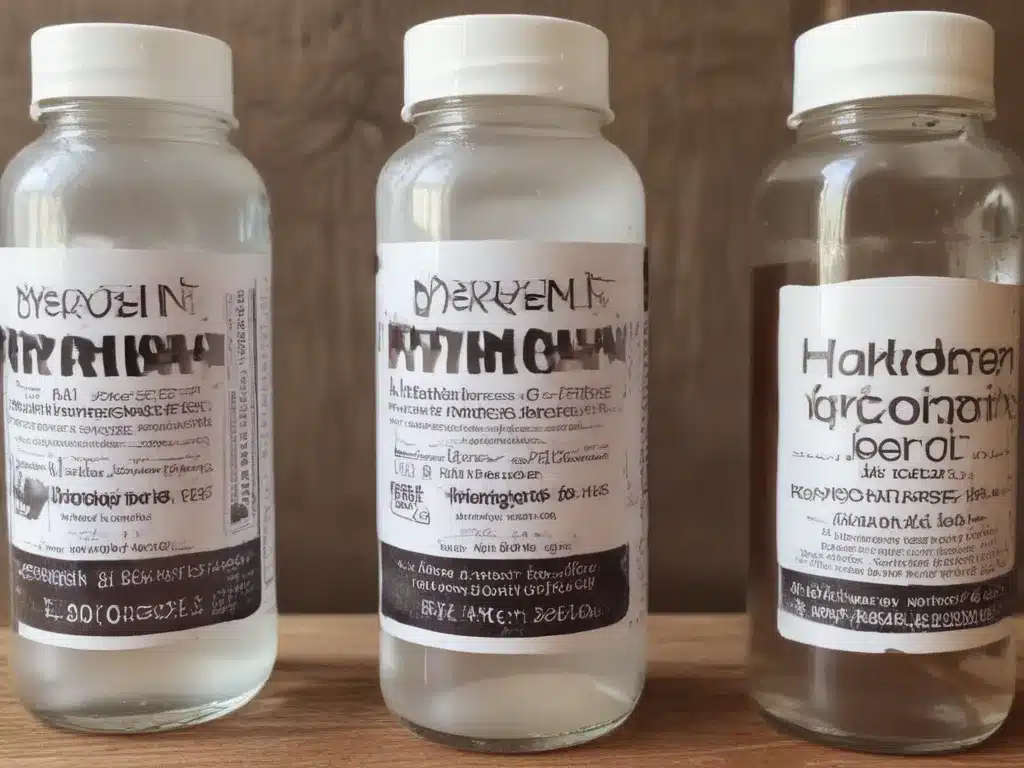What is Hydrogen Peroxide?
Hydrogen peroxide (H2O2) is a colorless, odorless liquid compound that is widely used for various purposes, ranging from household cleaning to personal care. It is a powerful oxidizing agent, which means it has the ability to break down and neutralize many types of organic matter, making it an effective disinfectant and bleaching agent.
Hydrogen peroxide is a naturally occurring compound found in the air, water, and even in our bodies. It is produced by many living organisms, including plants and animals, as a byproduct of metabolic processes. In the human body, hydrogen peroxide is produced by specialized cells called phagocytes, which use it as a weapon against invading pathogens.
Commercially, hydrogen peroxide is produced through a process called the anthraquinone process, which involves the catalytic hydrogenation of alkyl anthraquinones. This process results in a highly concentrated solution of hydrogen peroxide, which is then diluted to various strengths for different applications.
The Many Uses of Hydrogen Peroxide
Hydrogen peroxide has a wide range of applications, making it a truly versatile and indispensable compound. Here are some of the most common uses:
Household Cleaning
Hydrogen peroxide is a popular and effective household cleaning agent. Its oxidizing properties help remove tough stains, kill germs, and whiten surfaces. It can be used to clean and disinfect kitchen countertops, bathrooms, floors, and even clothing.
Personal Care
Hydrogen peroxide is a common ingredient in many personal care products, such as hair dyes, tooth whiteners, and acne treatments. Its bleaching and antiseptic properties make it an ideal choice for these applications.
Horticulture
In horticulture, hydrogen peroxide is used as a disinfectant for seeds, soil, and equipment. It can also be used as a foliar spray to prevent fungal diseases and promote plant growth.
Industrial Applications
Hydrogen peroxide has numerous industrial applications, including the production of chemical compounds, wastewater treatment, and pulp and paper bleaching.
The Benefits of Hydrogen Peroxide
Using hydrogen peroxide offers several benefits, making it an attractive choice for various applications:
-
Effective Disinfectant: Hydrogen peroxide is a powerful disinfectant that can kill a wide range of microorganisms, including bacteria, viruses, and fungi. It is particularly effective against pathogens like Staphylococcus aureus, Salmonella, and Escherichia coli.
-
Environmentally Friendly: Unlike many traditional disinfectants, hydrogen peroxide is an environmentally friendly option. It breaks down into water and oxygen, leaving no harmful residues or byproducts.
-
Versatile: Hydrogen peroxide can be used for a variety of purposes, from cleaning and disinfecting to personal care and horticulture. Its versatility makes it a valuable tool in many settings.
-
Cost-Effective: Hydrogen peroxide is relatively inexpensive compared to many other disinfectants and cleaning products, making it an economical choice for households and businesses alike.
-
Safe for Most Surfaces: When used correctly, hydrogen peroxide is safe for most surfaces, including plastics, metals, and fabrics. It is important to follow the recommended dilution and usage guidelines to avoid potential damage.
Precautions and Safety Considerations
While hydrogen peroxide is generally safe for use, it is important to handle it with care and follow proper safety precautions:
-
Dilution: Hydrogen peroxide is typically sold in concentrated form and must be diluted before use. Always follow the manufacturer’s instructions for proper dilution and use.
-
Eye and Skin Protection: Concentrated hydrogen peroxide can cause eye and skin irritation. Wear protective equipment, such as goggles and gloves, when handling concentrated solutions.
-
Ventilation: Use hydrogen peroxide in well-ventilated areas, as the fumes can be irritating to the respiratory system.
-
Storage: Store hydrogen peroxide in a cool, dark place, away from direct sunlight and heat sources. Exposure to light and heat can accelerate its decomposition.
-
Disposal: Dispose of unused or expired hydrogen peroxide solutions properly, following local regulations and guidelines.
Real-Life Examples and Applications
Hydrogen peroxide has been a versatile and valuable tool in various industries and settings. Here are some real-life examples and applications:
Hospitals and Healthcare Facilities
In hospitals and healthcare facilities, hydrogen peroxide is widely used as a disinfectant for cleaning surfaces, equipment, and medical instruments. Its broad-spectrum antimicrobial properties make it an effective choice for preventing the spread of infections and maintaining a safe and hygienic environment.
Food Processing Industry
The food processing industry relies on hydrogen peroxide as a sanitizing agent for equipment, surfaces, and packaging materials. It is particularly useful in the beverage industry for sterilizing bottles and cans, ensuring the safety and quality of the products.
Water Treatment
Hydrogen peroxide is employed in water treatment processes, such as disinfection, oxidation of contaminants, and odor control. It is an effective alternative to chlorine-based disinfectants and can be used in both municipal and industrial water treatment systems.
Horticulture and Agriculture
In horticulture and agriculture, hydrogen peroxide is used as a foliar spray to control fungal diseases and promote plant growth. It is also used for seed disinfection and soil treatment, helping to create a healthier growing environment for crops.
Textile Industry
The textile industry utilizes hydrogen peroxide for bleaching and whitening fabrics. Its ability to break down organic matter and remove stains makes it a valuable tool in the textile manufacturing process.
Conclusion
Hydrogen peroxide is a truly amazing and versatile compound with a wide range of applications. Its powerful oxidizing properties, coupled with its environmentally friendly nature and cost-effectiveness, make it an attractive choice for household cleaning, personal care, horticulture, and industrial applications. However, it is essential to handle and use hydrogen peroxide with proper safety precautions, following recommended dilution and usage guidelines. By understanding the benefits and potential risks of hydrogen peroxide, we can harness its power and unlock its full potential for various purposes.







